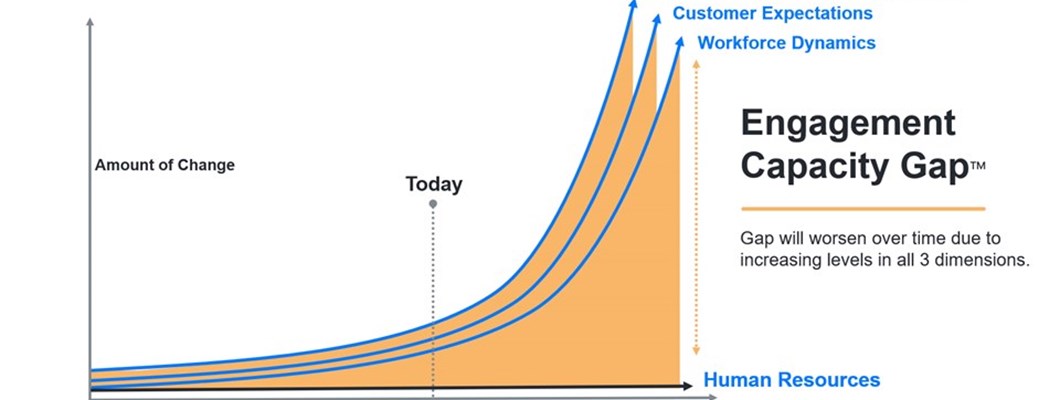It’s clear there is a growing engagement capacity gap: the gulf between what customers expect and the actual experiences they receive from brands.
Our mission for The Intelligence community is to create a resource for anyone wanting to close this gap. To understand and unravel the complexities of new approaches and technologies.
In addition to the community discussions, we’ll be inviting industry leaders to share their experiences; the successes, the failures, the lessons learned. Each month we’ll host a live session discussing different aspects of customer experience and how technology is affecting consumer behaviour.
On July 29th The Intelligence hosted its first of these events with guest speakers Ian Clatworthy (Hitachi), Ryan Hall (The Zeitgeist) and Clare Gray (Doctor Care Anywhere).
Here’s a recap of their insights:
Ian Clatworthy - Hitachi, Global Director Of Data Systems Product Marketing
- Hitachi is using a self-service approach to internal problem solving. For example, for solving IT issues, HR issues and for sales. Simplifying those simple, cloud based processes has reduced the amount of time teams are spending dealing with individual cases.
- Ian also discussed how Hitachi is leveraging self-service for how customers use and consume Hitachi solutions. He explained how their Virtual Rack Configurator started as a convenient event engagement tool, but became a self-service engine. The tool lets customers quickly configure rack solutions, simplifying complex information into a visual format without having a direct interaction with the customer.
- Ian also discussed an RnD project exploring how they can bring augmented reality into their support system, so not only do customers have the option to self-solve problems, but they also get that quality of care they expect from Hitachi.
- Ian also touched on how closely he and Hitachi are considering the metaverse a big part of their next gen strategy, explaining how self-service can be used in the metaverse to further improve customer support (as well as the implications for the other parts of Hitachi’s business).
Ryan Hall - The Zeitgeist, Founder
- Without putting customers and their needs at the heart of any technology or customer experience design solution, you’re missing the mark.
- While lots of brands are dipping their toes into the water with Intelligent Self-Service, there’s still an amazing opportunity to do more. If you look at how much revenue is lost globally through bad customer service ($65billion), it’s obvious brands can do better.
- Benefits for businesses: 42% would pay more for a friendlier, more welcoming experience. 43% would pay more for convenience, which is the crux and value add self-service gives back to consumers.
- What customers value: Efficiency, Convenience, Knowledgeable, Friendly.
- ROI: Improving CX increases genuine sales from 2-7%, which is a significant gain from what are quite simple CX improvements. Overall as a business case, this opportunity to improve customer self-service intelligently really starts to stack up as an interesting proposition and something brands should be focussed on.
- An omnichannel experience where consumers can jump from one experience to another but pick up the conversation is part of the territory for brands to win. Those brands enabling consumers to channel swap are delivering a much higher efficiency in delivering task resolution.
Clare Gray, Doctor Care Anywhere, Chief Of Staff
- There aren’t enough clinicians in the world to treat all of the people, but the demand of our population is growing. Regardless of age or preferred choice of contact, everyone needs healthcare so you have to cater for everyone equally.
- There is a general lack of transparency and flow of information between systems, leading to processes where patients have to repeat themselves.
- There is a wealth of opportunity for change.
- Virtual GP appointments skyrocketed from 6,000 per month to 50,000 per month.
- When adding additional services, how people get to those services is incredibly important, particularly getting to the right clinician. But you can’t assume people know what service or clinician they need for their treatment.
- Once healthcare begins utilising digital services, you get compared to every other digital service.
- The Doctor Care Anywhere user journey puts patients in the driver seat but also gives them control over the process, guiding them towards selecting the right treatment path. Based on the selections, it will judge the severity and adjust the response timeline accordingly, making better use of clinician time.
This, of course, only scratches the surface of what these 3 speakers discussed with the full session packed with many more insights and nuggets. You can find the full recording of this event in our member resources: https://the-intelligence.community/member-resources/


